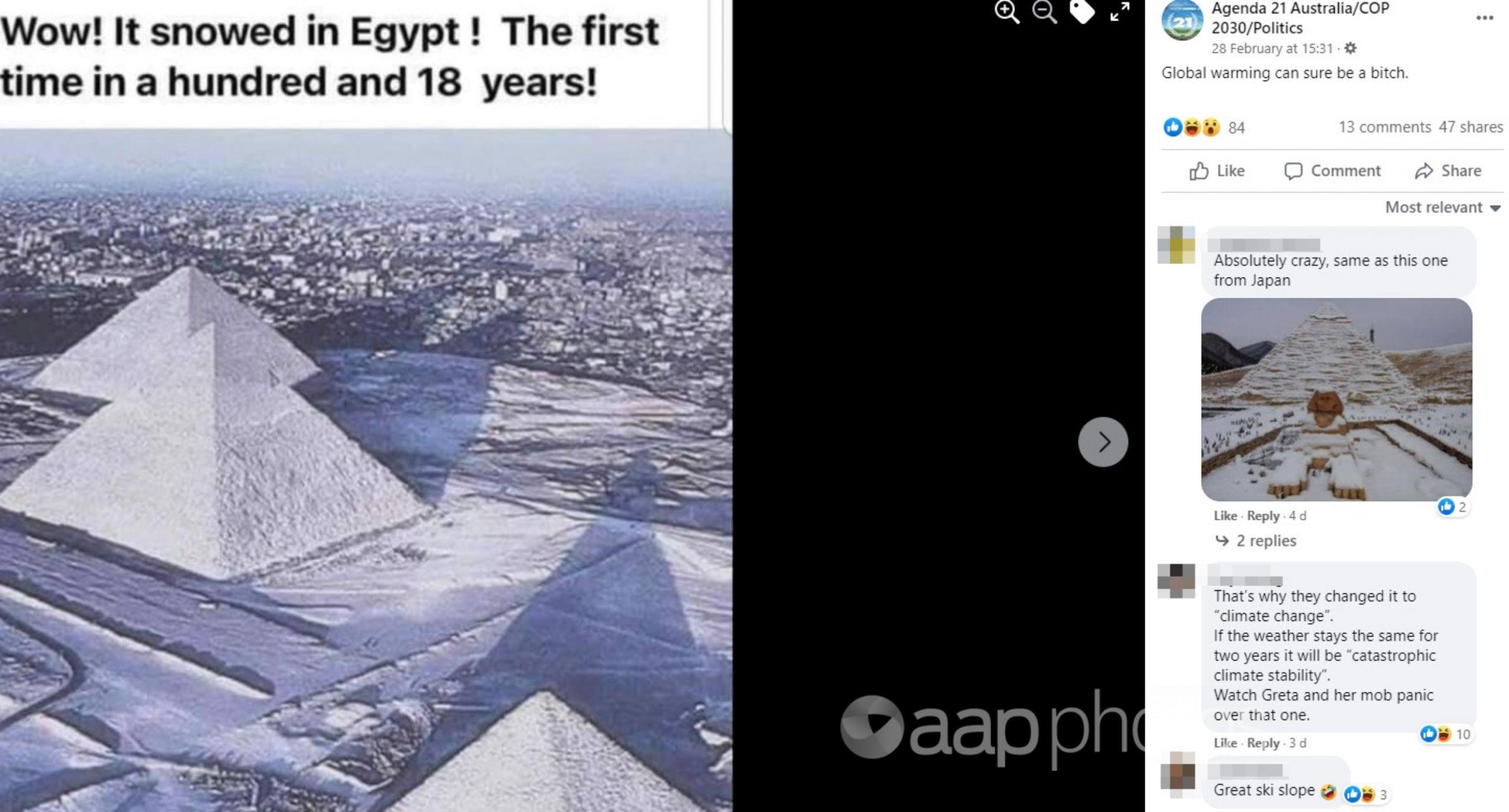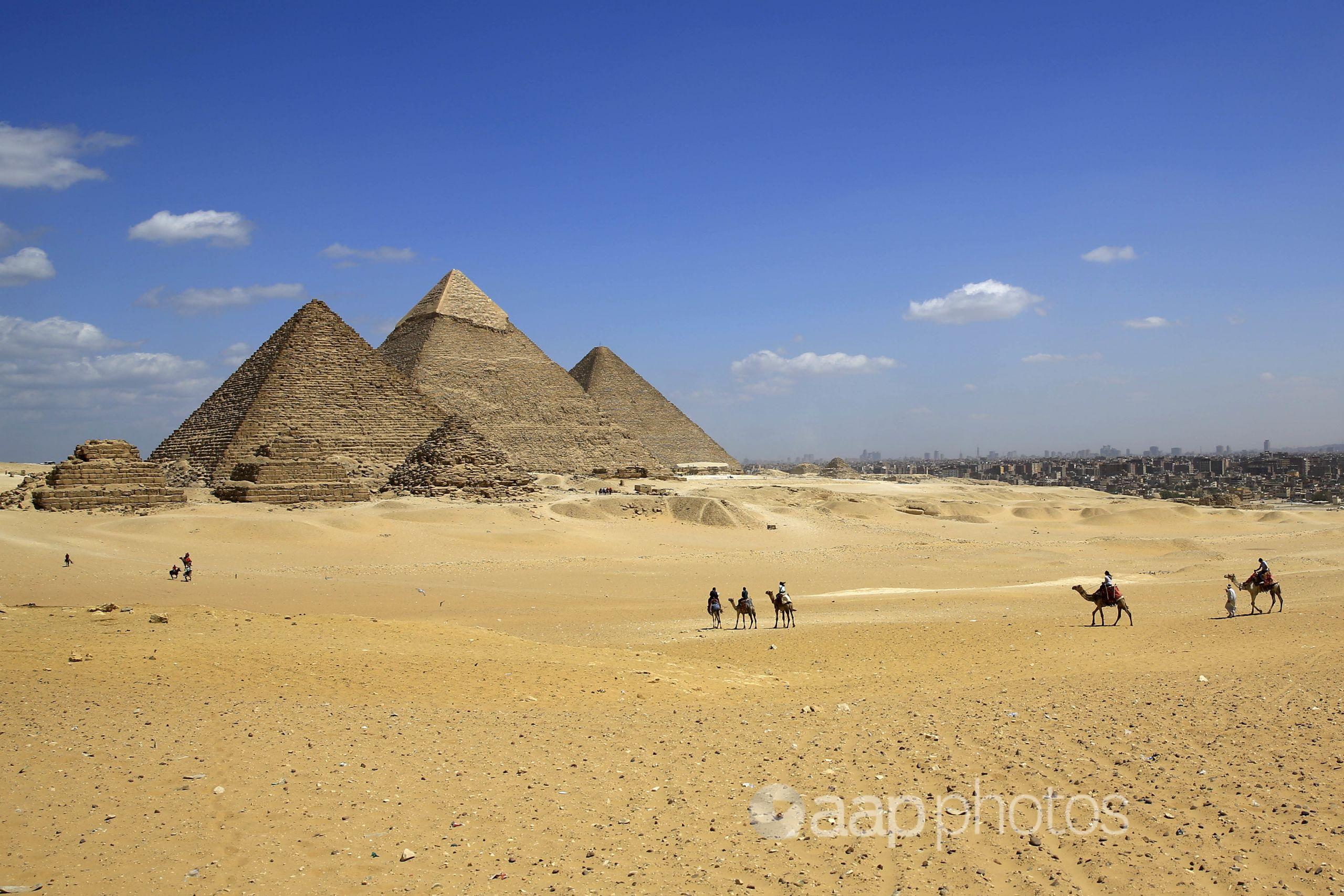The Statement
A meme shows a photo of Egypt’s famed Giza pyramids near Cairo purportedly covered in snow.
The image, posted to a Facebook page managed from Australia, includes the text: “Wow! It snowed in Egypt! The first time in a hundred and 18 years!” The post includes the caption text: “Global warming sure can be a bitch.”
At the time of publication, the February 28 post had been viewed more than 18,000 times. Another example of the image, accompanied by similar text, can be found here.

The Analysis
Egypt’s pyramids may be one of the wonders of the ancient world, but the image in the viral posts is less of a marvel – the snow has been artificially added to a long-used aerial photo of the 4,500-year-old tombs in their desert surrounds.
A reverse image search shows the unaltered image, including identical shadows, which was used on the cover of an Insight Guides tourism map for Cairo published as far back as 2000. The appearance of snow can be easily added to photos using editing software, or by simply manipulating the colour balance of an image, as appears to have been done with the pyramids picture.
A rare winter storm did hit Egypt in December 2013, leading to reports of snow in Cairo – although images of internationally renowned sights like the Sphinx coated in powder that circulated at the time were fake.
Some social media users claimed at the time it was first example of snow in the capital in 112 years, however that unverified suggestion was traced to a tweet from one user who admitted it was only a guess.
There have been more recent instances of snow in Egypt’s mountains in January 2020, as well as in other Middle East countries such as Syria, Israel, Jordan and Lebanon in February 2021.
Jim Andrews, a senior meteorologist with forecasting service AccuWeather, which specialises in global weather predictions, said snow is quite rare in Egypt.
“Does it snow in Egypt? Yes, but rarely outside of interior uplands or mountains, such as those in the Sinai,” he told AAP FactCheck in an email.
“I would guess that snow is unknown in much of Egypt. It is too dry and too mild for any more than rare falls of snow. In fact, I would say that south-central Sinai, with mountains rising to 7,000 or 8,000 feet, is likely the best place to see snow without leaving Egypt. Cairo is altogether another thing.”
Cairo is considered a desert climate with “virtually no rainfall during the year”, typically receiving rain on only a handful of days during winter months, according to the World Meteorological Organization. A 2014 report from the Egypt Meteorological Authority notes that Cairo receives “a little more than one centimetre of precipitation each year” (page 1).
Mr Andrews noted that at the time of the 2013 winter storms there were numerous photos and videos circulating showing “plausible snowfall”, although it was more likely they were “small hail, which can happen with significant accumulation more easily than true snow”.
The Verdict
Although snow is not unknown in Egypt, the image in the Facebook post has been manipulated to make it appear as if the pyramids were carpeted in powder. In fact, the unedited photo – which shows a snow-free desert landscape – has been in use for at least 20 years.
Altered Image – The image, video, or audio content has been edited or synthesised beyond adjustments for clarity or quality, in ways that could mislead people.
* AAP FactCheck is an accredited member of the International Fact-Checking Network. If you would like to support our independent, fact-based journalism, you can make a contribution to AAP here.
All information, text and images included on the AAP Websites is for personal use only and may not be re-written, copied, re-sold or re-distributed, framed, linked, shared onto social media or otherwise used whether for compensation of any kind or not, unless you have the prior written permission of AAP. For more information, please refer to our standard terms and conditions.


















